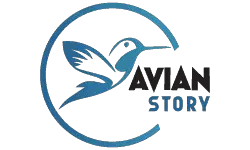Can Budgies Eat Carrots? An Expert’s Opinion
Budgies have special dietary needs that can be hard to meet. Fortunately, budgies can eat most vegetables as part of their balanced diet. But you’ve probably wondered whether budgerigars can eat carrots.
So can budgies eat carrot? Budgies can eat carrots and be healthy. They’re a good source of vitamin A that’s very important for your bird’s health. However, you should still limit the number of carrots in their diets. If your pet budgie eats too much carrot, he could become constipated.
We’ll explore the pros and cons of feeding carrots to your budgies and also see how they can be prepared and served safely and effectively.
Can Budgies Eat Carrot?
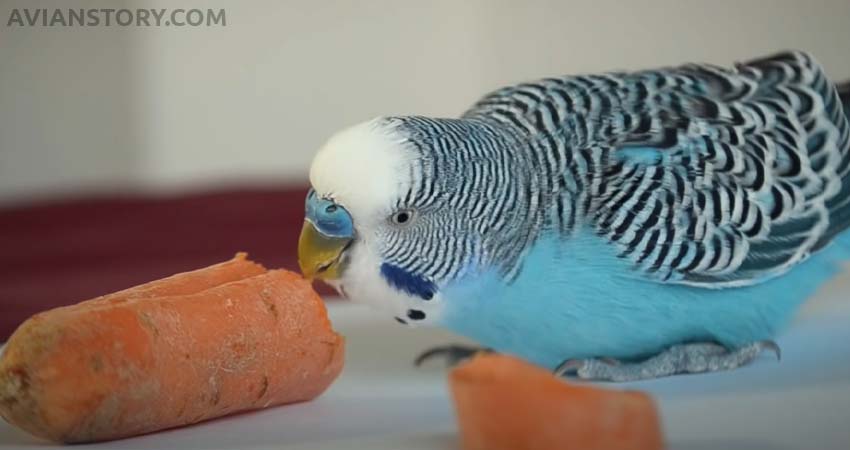
Carrots are a safe and healthy treat for budgies. If you’re on the hunt for natural and healthy snacks that you can feed your pet budgies, carrots are an obvious choice.
Carrots are rich in vitamins, antioxidants, and also minerals that help to keep your pet budgie healthy. They even contain dietary fiber to keep your budgie’s digestive system in top shape!
The essential vitamins in carrots are:
- Vitamin A: strengthens your budgerigar immune system, leads to healthy cellular telephone growth, and prevents the onset of cataracts. If your budgerigar’s eyes are taking on a dull appearance, this could be a sign that he is lacking in vitamin A.
- Vitamin K: good for blood coagulation, wound healing, and bone health.
- Vitamin C: builds antibodies to boost the immune system
Carrots also pack more beta-carotene. According to a study by Monash University, many of the health benefits of vitamin A are derived from beta-carotene. This is because it is converted to vitamin A immediately after it enters the body.
Beta-carotene helps with plumage, responsible for brightly colored feathers. Also, beta-carotene is a potent antioxidant that can help prevent cancerous growth.
Essential minerals include calcium and potassium. Calcium is good for your budgie’s bones, while potassium promotes healthy muscles and stable blood pressure.
If you’re wondering, can budgies eat carrot tops? Yes, they can, as all their parts are edible, including the roots, stems, and leafy green tops.
Do Budgies Like Carrots?
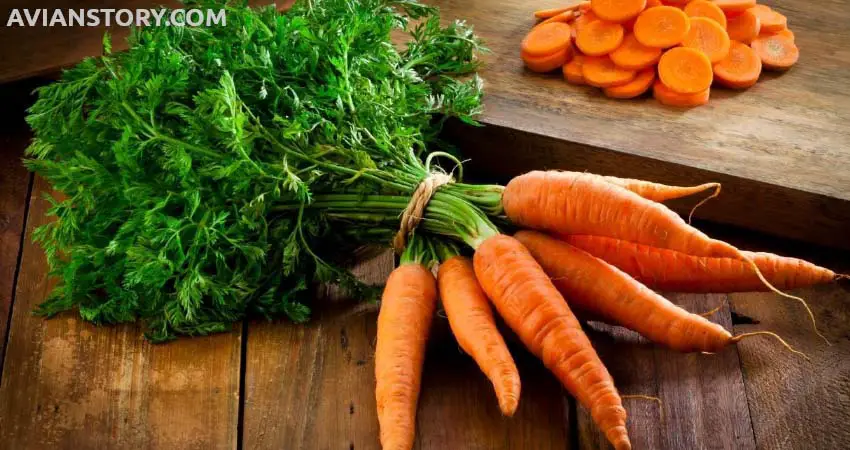
Budgies love the taste of carrots. However, if you’re introducing carrots, you might have to trick your budgie into it. It’s more likely that your budgerigar doesn’t understand carrots are safe.
Trick your pet by changing how you serve your carrots. For instance, you can add carrots to your budgie’s favorite foods. Your budgie will be tempted to eat and take carrot bites.
Carrot roots might be intimidating at first. Therefore, another trick is to place the carrot tops facing up. Unlike the orange roots, the tops are softer and green, making them less intimidating.
Still, you can encourage your bird to eat the orange part by hanging chunks from the bars of the cage. That way, their curiosity will get the better of them!
Downsides Of Feeding Carrots To Budgies
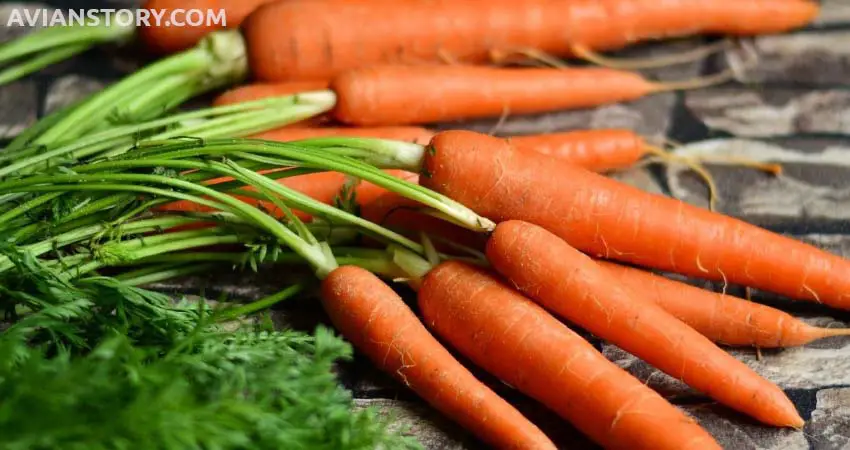
Don’t forget too much of anything can be harmful, so don’t overfeed carrots.
- Carrots are high in sugar. Although not technically toxic, high-sugar foods can cause diabetes mellitus in budgies that can lead to obesity or issues in the pancreas or reproductive organs.
- If your budgie is trying to lose weight, carrots might not be ideal since they are high in calories and carbs.
- The fiber content in carrots can sometimes cause digestion problems for budgies. If the droppings turn watery, it’s most likely a sign of overindulgence. Simply cut back the carrots for a day or two until the droppings are back to normal.
- Too much carotene can result in a vitamin A overdose, known as Hypervitaminosis A, which can be dangerous.
How To Feed Carrots To Budgies?
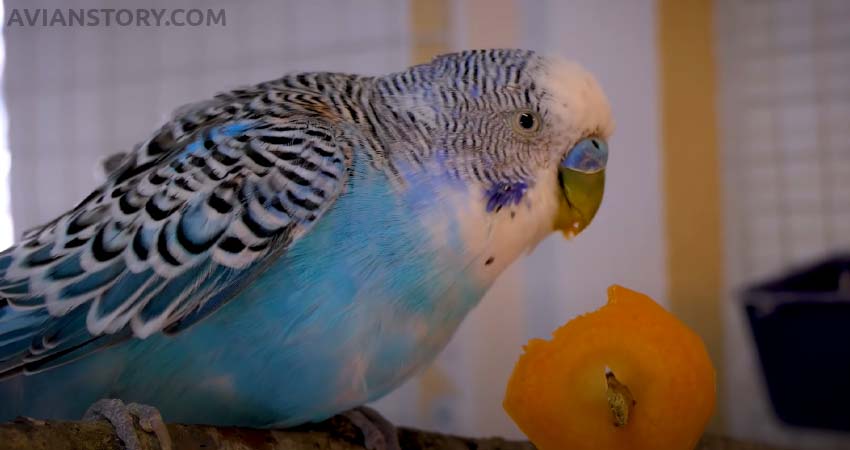
Only feed your budgies organic fresh carrots. This ensures that there are no toxic herbicides. Also, wash the carrots thoroughly. If inorganic carrots are the only ones available, wash and peel them, as most pesticides get concentrated beneath the skin.
Budgies are tiny birds. So to ensure your budgie doesn’t choke, shred, grate, or cut the carrot into smaller pieces. Also, fine pieces will make it easier for the parent to feed their young. Plus, you should consider giving baby carrots to young budgies.
But is cooked carrot better? Or can budgies eat raw carrot? Well, we recommend raw carrots. After all, carrots are healthiest in their raw. In addition, the crunch of raw carrots provides necessary jaw exercises for your budgie.
How Often Can Budgies Eat Carrots?
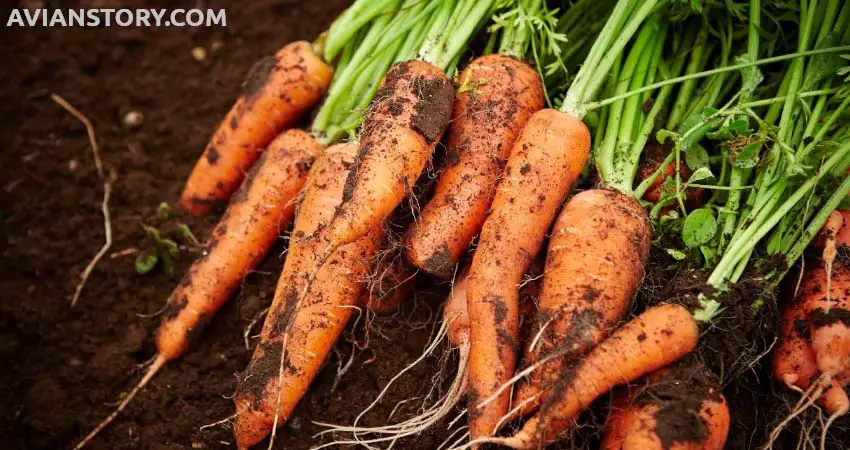
It’s important to know how much carrot can a budgie eat and how often? We recommend giving carrots as a treat during training sessions or out-of-cage time. Individual birds vary in their food needs and preferences.
Generally, 20-25% of your budgie’s diet should come from vegetables, including carrots. Use this guide to determine how many carrots to feed your budgie based on the rest of its diet. Can budgies eat carrots everyday? Yes, you can offer a maximum of one teaspoon of carrots per day.
FAQs
Here are some answers to frequently asked questions about feeding carrots to your budgie.
Can Budgies Eat Carrots Cooked?
Budgerigars have a natural fondness for fresh food. Therefore, don’t give them carrots that are cooked or processed in any way.
Can Budgies Eat Carrot Leaves?
Budgies can eat carrot leaves. However, the leafy greens don’t provide as much vitamin A as the roots.
Can Budgies Eat Carrot Skin?
Yes. In fact, an unpeeled carrot is more nutritious than a peeled one. The carrot skin has more concentrated vitamin C.
Conclusion
Are carrots good for budgies? They are full of nutrients that can support your bird’s well-being. In fact, carrots are known for their high vitamin A content and the benefits associated with the nutrient for birds.
However, only give carrots as long as it is not their main diet. Also, ensure that the carrots you give to your bird are appropriately washed and cut into small pieces so they do not choke while eating.
